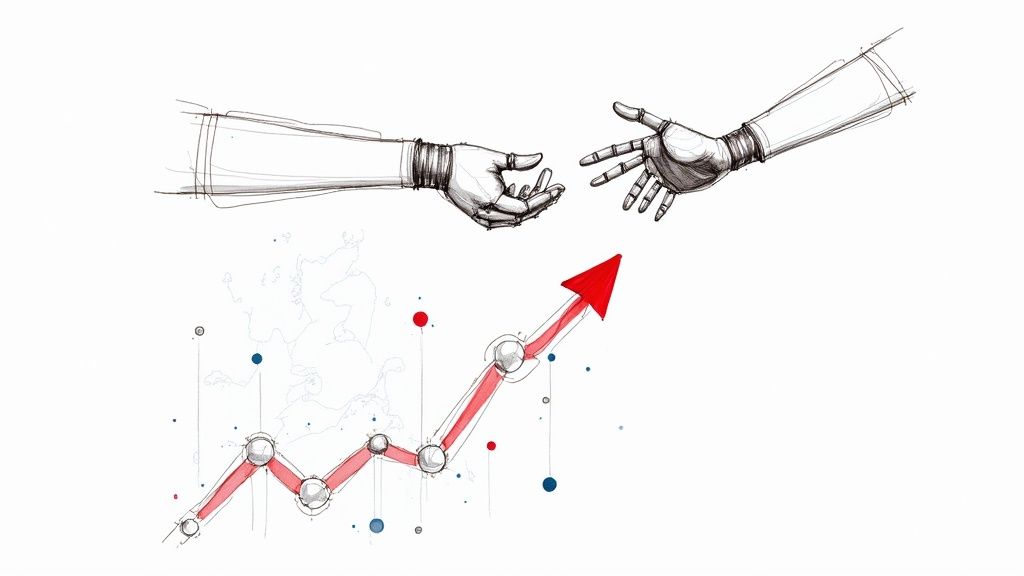AI Automation: Boost Your UK Business Growth Today
Discover how AI automation can transform your UK business with actionable insights, benefits, and real-world examples. Get started now!

When people talk about automation, they often picture a simple robot doing the same task over and over. That’s the old way. AI automation is something else entirely—it’s about giving software the ability to think, learn, and adapt, much like a human expert.
What Is AI Automation Really?
Let’s get straight to the point. Traditional automation is like a factory arm programmed to do one specific job perfectly, endlessly. AI automation, on the other hand, is more like a team of digital specialists. They don't just follow instructions; they learn from experience, make smart judgements, and get better at their jobs over time.
This technology is built to tackle the complex, unpredictable work that used to be strictly human territory. It’s not just about adding a new tool; it’s about fundamentally changing how work gets done.
Beyond Repetitive Tasks
So, what makes AI automation different from a simple script? It’s powered by technologies like machine learning and natural language processing, which allow it to understand context, spot patterns, and handle situations it hasn't seen before.
Think about it this way. AI automation can:
- Read between the lines: It can analyse customer emails to figure out not just what they’re saying, but how they feel—are they happy, frustrated, or about to churn?
- See into the future: It can forecast how much stock you’ll need by looking at past sales, current market trends, and even the weather.
- Get smarter on the job: The more data it processes, the more it refines its approach, constantly improving its own performance without needing a developer to step in.
This is where automation stops being a simple cost-cutter and starts becoming a serious competitive advantage. For a broader look at how automation helps companies, especially smaller ones, this guide on workflow automation for small businesses offers some great insights.
The Real-World Impact in the UK
This isn't just theory; it's happening right now. As of 2024, more than half of UK businesses (52%) are already using AI automation in their day-to-day operations.
The results speak for themselves. Companies that have made the switch report a 20-30% jump in productivity. Even more telling, a massive 92% of them directly credit AI automation with boosting their revenue.
Take a professional services firm in Manchester, for example. They were spending 35 hours every week just putting together client proposals. After bringing in AI, that time dropped to just 6 hours. The result? They managed an 18% increase in new client wins in just six months.
When you free your team from tedious, repetitive work, you give them the space to focus on what really matters: strategy, creativity, and building relationships. It’s a powerful shift, but it all starts with a clear plan.
What Are the Real Benefits of AI Automation?
Bringing AI automation into your business is about much more than just clawing back a few hours in the day. It’s a strategic shift that delivers real, measurable advantages across the entire organisation. Think of it as upgrading your operational engine, turning routine tasks into a source of valuable insight and a genuine competitive edge.
The real magic happens when you see how it empowers individual teams. By handing over the mundane, repetitive work to AI, you free up your people to focus on what they do best: thinking critically, solving complex problems, and driving growth. It's less about replacing people and more about augmenting their abilities.
A Look at How AI Automation Transforms Business Functions
Let's get practical. In the finance department, manually processing invoices is a classic bottleneck. It’s slow, tedious, and surprisingly error-prone—some studies show manual error rates can be as high as 3.6%. An AI system, on the other hand, can scan, verify, and process thousands of invoices with near-perfect accuracy, freeing your team to focus on high-value financial analysis instead of data entry.
It's a similar story in marketing. The goal has always been to connect with customers on a personal level, but doing that at scale is a huge challenge. AI algorithms can analyse customer behaviour in real-time, delivering hyper-personalised product recommendations or timely marketing messages. This kind of customisation used to be the exclusive domain of giants with massive budgets. You can explore a variety of AI tools for business that make this possible.
And for operations, the impact is just as significant. AI can monitor equipment to predict when maintenance is needed before a costly breakdown occurs. It can also fine-tune your supply chain by forecasting demand with uncanny accuracy, making sure you have the right stock in the right place at the right time.
The table below breaks down how AI automation can reshape key departments, moving them from slow, manual processes to smarter, more efficient ways of working.
How AI Automation Transforms Business Functions
| Department | Traditional Process | AI Automated Process | Key Benefit |
|---|---|---|---|
| Finance | Manual invoice entry and reconciliation, prone to errors and delays. | AI scans, extracts data, and processes invoices automatically. | Faster payments, drastically reduced error rates, and more time for strategic financial planning. |
| Marketing | Broad, segmented campaigns based on historical data. | Real-time analysis of customer behaviour to deliver personalised content and offers. | Higher engagement and conversion rates, leading to increased customer loyalty. |
| HR | Manually screening hundreds of CVs for open positions. | AI algorithms screen and shortlist the most qualified candidates based on set criteria. | Faster hiring cycles, reduced bias, and a better candidate experience. |
| Operations | Reactive maintenance after equipment failure; manual stock-level checks. | Predictive maintenance alerts and automated demand forecasting. | Minimised downtime, optimised inventory, and a more resilient supply chain. |
Ultimately, AI automation empowers teams to stop focusing on the "what" (processing data) and start asking "why" (analysing trends and shaping strategy). This is where genuine, lasting growth comes from.
The Ripple Effect of Smart Automation
When you implement AI automation correctly, its advantages ripple through the entire business, creating a more intelligent and agile organisation.
Here are the four key benefits we see time and time again:
- Fewer Costly Mistakes: By taking human error out of repetitive tasks like data entry, AI significantly cuts down on mistakes in everything from financial reports to customer orders.
- Smarter, Faster Decisions: AI provides clean, real-time data and predictive insights, giving leaders the confidence to make informed strategic choices without delay.
- Happier, More Engaged Employees: When you free your team from tedious work, they can focus on more creative and challenging projects. This leads to higher job satisfaction and better staff retention.
- Operations That Scale With You: AI-powered systems can handle sudden spikes in workload without the need to hire and train new staff, allowing your business to grow seamlessly.
Understanding the nuts and bolts of workflow automation is a great next step. It’s not about a single piece of software, but about fundamentally building a smarter, more capable business from the inside out.
Putting AI Automation to Work in UK Industries
It's one thing to talk about the theory behind AI automation, but seeing it in action is where you really grasp its power. Across the UK, businesses are already putting this technology to work to solve genuine, industry-specific problems. From the financial hub of London to healthcare services up in Scotland, AI is making a tangible difference right now.
The UK's adoption of this technology is happening incredibly quickly. Between 2023 and 2025 alone, the number of AI companies in the country shot up by 85%, reaching 5,800 firms. This sector pulled in revenues of £23.9 billion and has been growing 150 times faster than the rest of the UK economy since 2022. This isn't just a niche trend; AI is becoming a fundamental part of business across 22 different sectors.
Finance: Real-Time Fraud Detection
In London's fast-moving fintech world, security and speed are everything. Firms are now using AI automation to sift through thousands of transactions every second, spotting suspicious patterns that a human analyst could never hope to catch.
- The Problem: Traditional fraud detection relied on static rules that clever criminals learned to sidestep with ease.
- The AI Solution: Machine learning models are trained on vast amounts of historical data, teaching them to recognise subtle red flags in real-time. This means they can flag potentially fraudulent activity the moment it happens.
- The Outcome: Financial losses are cut dramatically, and customer trust gets a massive boost—all without slowing down legitimate payments.
Healthcare: Streamlined Patient Management
Healthcare providers all over the UK are swamped with paperwork and administrative duties. AI automation is starting to lift that burden, freeing up staff to concentrate on what they were trained to do: care for patients.
By automating routine administrative work, healthcare organisations can free up skilled professionals to focus on what truly matters—delivering high-quality patient care. This shift not only improves efficiency but also boosts staff morale and patient outcomes.
AI systems can automatically sort patient records, schedule appointments based on clinical urgency and staff availability, and even transcribe a doctor's spoken notes. This makes sure that crucial data is accurate, easy to find, and kept secure, which is a vital step toward modernising the entire patient experience.
Retail and E-commerce: Supply Chain Optimisation
For any retailer, success often comes down to having the right product, in the right place, at the right time. AI-powered predictive analytics are completely changing how UK retailers manage their supply chains.
These sophisticated systems analyse everything from historical sales data and seasonal trends to local weather forecasts and public events to predict demand with remarkable accuracy.
This means businesses are no longer tying up huge amounts of capital in overstocked warehouses, nor are they losing sales and frustrating customers due to unexpected stockouts. These examples aren't futuristic concepts; they show what's already happening and offer a clear window into the future of smarter, more efficient business.
Your Roadmap to Successful AI Implementation
Jumping into AI automation can feel like a huge undertaking, but it doesn't have to be. The key is to think of it not as a single, massive project, but as a series of well-planned, manageable steps. As we explored in our AI adoption guide, a clear vision and a practical roadmap are what separate a successful initiative from a stalled one.
The first step is always about discovery. You need to look closely at your own operations and find the processes that are repetitive, bogged down by data, or simply prone to human error. These are your best starting points for automation. Think about the daily tasks that create bottlenecks or tie up your talented people in work that doesn't really move the needle.
Pinpoint High-Impact Processes
Begin by taking a good, hard look at your day-to-day operations. Where are your teams sinking the most time into manual work? It could be anything from sorting through customer support emails and processing invoices to pulling together weekly performance reports. The goal here is to find the "low-hanging fruit"—those areas where a small injection of automation will give you the biggest, quickest win.
Once you have a list of potential candidates, you need to define what success actually looks like. Setting clear goals and Key Performance Indicators (KPIs) is non-negotiable. Are you trying to slash a process time by 30%? Maybe you want to cut down errors by 50%, or free up a specific number of hours for your team each week. Having these tangible metrics from the outset is crucial for measuring your impact and proving the business case later on. A Custom AI Strategy report can formalise this process.
Select Your Tools and Start Small
With your goals in place, it’s time to think about the solution. This might mean choosing from existing AI tools, or you might need a custom-built solution for a more unique challenge. If you’re exploring something like a customer-facing bot, a practical guide on how to build a chatbot can give you a real sense of what’s involved.
Whatever you choose, resist the temptation to go for a company-wide rollout straight away. Instead, launch a small pilot project. This focused trial lets you test the solution in a controlled environment, gather real-world data, and demonstrate its value to the people who matter. A successful pilot creates believers and builds the momentum you need to scale up. Following a structured process, like a defined AI Product Development Workflow, is vital to manage this from concept all the way through to completion.
This workflow shows the essential technical journey of bringing an AI model to life.
As the graphic shows, it all starts with good data. High-quality data collection is the absolute foundation for training an effective model that delivers results when deployed.
Scaling with Confidence
After your pilot has proven its worth, you're ready to start scaling the solution across other parts of the organisation. This phased approach is far less disruptive and gives your teams the time they need to adapt to new ways of working. By building on small, proven successes, you can move forward with confidence, ensuring every step you take is aligned with your broader business goals.
How to Choose the Right AI Automation Partner
Picking the right partner for your AI automation journey is probably the most critical decision you'll make. It’s often the deciding factor between a project that stalls and bleeds money, and one that delivers genuine business results. The technology is just one part of it; a real partner brings strategic thinking, deep industry experience, and a collaborative mindset to the table.
This isn’t about just hiring a vendor to build a piece of software. The right partner acts more like an extension of your own team. They take the time to really get under the skin of your operational headaches and understand where you want to be in the long run. They should be able to turn your business goals into a clear, no-nonsense technical roadmap.
Beyond the Technical Checklist
It’s easy to get bogged down in technical jargon when you're vetting potential partners. Of course, they need to be experts in machine learning and data science—that's the price of entry. But a great partner brings so much more to the relationship.
Look for a team that has a solid history of getting things done. They should be able to walk you through concrete examples and real-world use cases that show they’ve tackled problems similar to yours. Their experience needs to go beyond just the technology and into the specific quirks and challenges of your industry.
A partnership built on a shared vision is crucial. Your AI automation provider should be as invested in your business outcomes as you are, offering proactive guidance and adapting as your needs evolve.
This kind of relationship is founded on transparency and a genuine commitment to succeeding together. It’s a process of AI co creation, not just another business transaction.
Finding a Flexible and Scalable Model
As your business grows, your automation needs are going to change—that’s a given. A rigid, one-and-done project model can become a liability very quickly. This is precisely why a more flexible, end-to-end service model is often the smarter way to go.
Think about a solution like AI Automation as a Service. This kind of approach gives you ongoing support, maintenance, and strategic advice, making sure your AI solutions can grow with you. It lets you start small, prove the value with a pilot, and then expand your automation efforts with confidence. It’s the best of both worlds: strategic consulting and hands-on delivery. As we’ve talked about before, focusing first on key improvements to your internal tooling can be a powerful way to get started.
At the end of the day, it's the people behind the technology that make all the difference. A successful partnership hinges on clear communication, shared goals, and a team you trust to guide you through every step. Before you sign anything, get to know the individuals who will be working on your project. We encourage you to meet our expert team—it’s the best way to see what a true partnership feels like and understand the depth of experience we bring to every client.
The Future of Work and Human-AI Collaboration
Let's get one thing straight. The conversation around AI automation is almost always sidetracked by a fear of replacement. But frankly, that misses the point entirely. This isn't a sci-fi story about machines taking over. It's about changing the very definition of work and freeing up our own potential.
Think of AI as the ultimate collaborator for your team. Its real job is to take on the tedious, data-intensive grunt work—the stuff that drains time and energy. This frees your people to focus on what humans do best: thinking creatively, devising strategy, and solving the truly messy, complex problems. It's a shift from just getting tasks done to genuine innovation.
We're already seeing this happen. In the UK public sector, for example, it's predicted that generative AI will support around 41% of work activities by 2025. The impact isn't uniform, of course. Education could see support for 49% of its tasks, while healthcare sits at 33%. It's a fascinating breakdown, and you can learn more about these public sector findings if you want to dig into the details.
Fostering a Culture of Continuous Learning
Getting this right isn't just about plugging in new software; it’s a cultural shift. The whole thing hinges on a real commitment to upskilling and learning, making sure your team has the confidence and capability to work alongside these new tools.
The organisations that will thrive are the ones building a culture where people are always encouraged to develop new skills. That means putting a deliberate focus on:
- Critical Thinking and Strategy: Teaching people how to question and interpret AI-generated insights to make smarter decisions.
- Creative Problem-Solving: Letting AI handle the 'what' so your team can spend its brainpower on the 'why' and 'how'.
- Emotional Intelligence: Doubling down on communication, leadership, and teamwork—abilities that remain uniquely human.
This isn't just about damage control. It's a proactive game plan for building a workforce that's more adaptable, resilient, and ready for whatever comes next.
The real aim isn't just to automate tasks; it's to augment human intelligence. When AI manages the data crunching, your people are free to chase the ideas, build the relationships, and spark the innovations that will actually shape your business's future.
Ultimately, the future of work is a partnership. It's a model of AI co creation where human creativity is amplified by the sheer processing power of artificial intelligence. By preparing your team for this collaboration now, you're not just reacting to change—you’re getting into a position to lead it. Building a solid AI strategy consulting plan is the first crucial step.
To build a future-proof organisation and start your journey with AI automation, connect with Ekipa AI’s expert team today. Get started at https://www.ekipa.ai/team.



